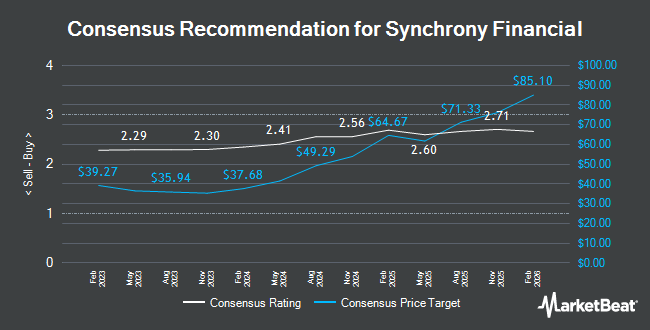Synchrony Financial (NYSE:SYF - Get Free Report) had its price target reduced by analysts at JPMorgan Chase & Co. from $76.00 to $50.00 in a research note issued on Tuesday,Benzinga reports. The firm currently has an "overweight" rating on the financial services provider's stock. JPMorgan Chase & Co.'s price objective indicates a potential upside of 8.45% from the company's previous close.
Other research analysts also recently issued reports about the company. UBS Group increased their price objective on Synchrony Financial from $58.00 to $66.00 and gave the stock a "neutral" rating in a report on Monday, January 13th. Royal Bank of Canada lifted their price objective on shares of Synchrony Financial from $70.00 to $73.00 and gave the company a "sector perform" rating in a report on Wednesday, January 29th. Barclays upgraded shares of Synchrony Financial from an "equal weight" rating to an "overweight" rating and increased their target price for the stock from $59.00 to $79.00 in a report on Monday, January 6th. Compass Point downgraded shares of Synchrony Financial from a "buy" rating to a "neutral" rating and set a $70.00 target price for the company. in a research report on Tuesday, January 28th. Finally, Keefe, Bruyette & Woods increased their price objective on shares of Synchrony Financial from $62.00 to $82.00 and gave the stock an "outperform" rating in a research note on Monday, December 9th. Eight research analysts have rated the stock with a hold rating, twelve have assigned a buy rating and one has issued a strong buy rating to the company's stock. According to data from MarketBeat, the stock has an average rating of "Moderate Buy" and an average target price of $65.11.
Get Our Latest Analysis on Synchrony Financial
Synchrony Financial Stock Down 1.1 %
SYF stock traded down $0.53 during mid-day trading on Tuesday, hitting $46.10. 6,550,656 shares of the company were exchanged, compared to its average volume of 3,960,140. The company has a debt-to-equity ratio of 1.01, a quick ratio of 1.24 and a current ratio of 1.24. Synchrony Financial has a 1-year low of $39.67 and a 1-year high of $70.93. The firm's 50 day simple moving average is $56.20 and its 200 day simple moving average is $60.41. The firm has a market cap of $17.92 billion, a P/E ratio of 5.40, a P/E/G ratio of 0.71 and a beta of 1.45.
Synchrony Financial (NYSE:SYF - Get Free Report) last issued its quarterly earnings data on Tuesday, January 28th. The financial services provider reported $1.91 EPS for the quarter, topping analysts' consensus estimates of $1.89 by $0.02. Synchrony Financial had a net margin of 15.36% and a return on equity of 18.30%. On average, sell-side analysts predict that Synchrony Financial will post 7.67 EPS for the current fiscal year.
Institutional Trading of Synchrony Financial
Hedge funds have recently added to or reduced their stakes in the company. Bogart Wealth LLC bought a new position in Synchrony Financial during the 4th quarter worth $26,000. TCTC Holdings LLC bought a new position in Synchrony Financial during the fourth quarter worth about $27,000. Y.D. More Investments Ltd raised its stake in Synchrony Financial by 111.5% in the 4th quarter. Y.D. More Investments Ltd now owns 480 shares of the financial services provider's stock worth $31,000 after purchasing an additional 253 shares in the last quarter. Accredited Wealth Management LLC bought a new stake in Synchrony Financial in the 4th quarter valued at about $38,000. Finally, Raleigh Capital Management Inc. increased its holdings in shares of Synchrony Financial by 151.4% during the fourth quarter. Raleigh Capital Management Inc. now owns 807 shares of the financial services provider's stock worth $52,000 after purchasing an additional 486 shares during the period. 96.48% of the stock is owned by institutional investors and hedge funds.
Synchrony Financial Company Profile
(
Get Free Report)
Synchrony Financial, together with its subsidiaries, operates as a consumer financial services company in the United States. It provides credit products, such as credit cards, commercial credit products, and consumer installment loans. The company also offers private label credit cards, dual co-brand and general purpose credit cards, short- and long-term installment loans, and consumer banking products; and deposit products, including certificates of deposit, individual retirement accounts, money market accounts, and savings accounts, and sweep and affinity deposits, as well as accepts deposits through third-party securities brokerage firms.
See Also

Before you consider Synchrony Financial, you'll want to hear this.
MarketBeat keeps track of Wall Street's top-rated and best performing research analysts and the stocks they recommend to their clients on a daily basis. MarketBeat has identified the five stocks that top analysts are quietly whispering to their clients to buy now before the broader market catches on... and Synchrony Financial wasn't on the list.
While Synchrony Financial currently has a Moderate Buy rating among analysts, top-rated analysts believe these five stocks are better buys.
View The Five Stocks Here
Discover the 10 Best High-Yield Dividend Stocks for 2025 and secure reliable income in uncertain markets. Download the report now to identify top dividend payers and avoid common yield traps.
Get This Free Report
Like this article? Share it with a colleague.
Link copied to clipboard.